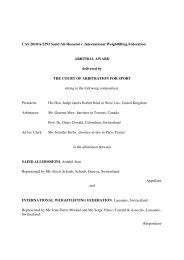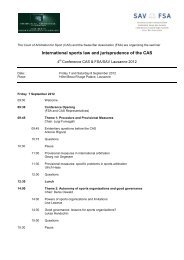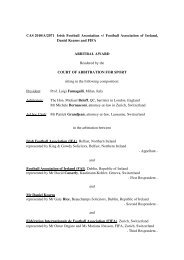(CAS) Bulletin - Tribunal Arbitral du Sport / TAS
(CAS) Bulletin - Tribunal Arbitral du Sport / TAS
(CAS) Bulletin - Tribunal Arbitral du Sport / TAS
You also want an ePaper? Increase the reach of your titles
YUMPU automatically turns print PDFs into web optimized ePapers that Google loves.
in Article 51.3 of the CAF Statutes, which is 10 days.<br />
The Panel noted that the CAF Secretary General,<br />
Mr El Amrani, had signed the Appealed Decision<br />
and stated that it was not a reference to Article<br />
R49 of the Code, so determined to disregard the<br />
Appellant’s submission on that point, which seemed<br />
self defeating. The Panel therefore had to decide if<br />
this was an in<strong>du</strong>lgence by the Respondent to extend<br />
the deadline or a mistake. Even if it was the latter,<br />
the Panel determined that it would not be right to<br />
hold the Respondent’s mistake against the Appellant.<br />
The Panel noted the <strong>CAS</strong> jurisprudence in <strong>CAS</strong><br />
2008/A/1708 and <strong>CAS</strong> 2009/A/2439 in which<br />
the parties faced a similar confl ict between two<br />
apparently confl icting time limits set by FIFA. As<br />
such, the Panel determined to confi rm the Appeal<br />
had been made in time, the 21 days expressly granted<br />
by the Respondent in the Appealed Decision.<br />
Secondly, the Respondent challenged the extent of<br />
the Appellant’s prayers for relief in the absence of<br />
Burkina Faso as a respondent to these proceedings,<br />
claiming the CAF lacked the standing to be sued and<br />
that the relief ultimately sought affected the rights<br />
of that third party, which was not present to defend<br />
itself.<br />
The Panel noted the Respondent’s agreement to<br />
be a respondent in this matter, confi rmed by its<br />
participation in this arbitration, the signing of the<br />
order of proce<strong>du</strong>re and its clarifi cation given at the<br />
hearing that it wished to respond to allegations made<br />
against it, but the Panel also noted the Respondent’s<br />
position that the Burkina Faso FF should have been<br />
the “principle ” respondent in this matter.<br />
The Respondent directed the Panel to Article R48 of<br />
the Code. The Appellant did not bring the Burkina<br />
Faso FF into these proceedings and the scope of the<br />
Panel’s review is limited to those prayers that the<br />
Respondent is the subject of. The Appellant’s prayers<br />
for relief included the request that the Panel determine<br />
that “(…) Burkina Faso should lose the two matches by<br />
penalty (3-0). This again would have the consequence that the<br />
team of the Namibian Football Association would take part in<br />
the fi nal round of the Africa Cup of Nations instead the team<br />
of Burkina Faso”.<br />
The Panel noted that it was ultimately the choice of<br />
the Appellant against whom it appealed, but by not<br />
including the Burkina Faso FF as a party, the Panel<br />
has determined that its scope of review is limited to a<br />
review of the Appealed Decision alone. In the event<br />
that, on the merits, it is determined to overturn the<br />
Appealed Decision, then this Panel would be unable<br />
to go further and issue an award that would have the<br />
effect of replacing Burkina Faso with Namibia at<br />
AFCON 2012.<br />
The essence of the dispute is between two national<br />
federations, where one believes the other has<br />
fi elded an ineligible player. It has sought a decision<br />
to that effect from its Confederation and for the<br />
Confederation to then penalize that other national<br />
federation fi rstly by reversing the match scores and<br />
then to recalculate the qualifi cation points replacing<br />
one national federation with the other in AFCON<br />
2012. The Panel does not consider the CAF as the<br />
“passive subject” of the claim brought before <strong>CAS</strong> by<br />
way of the appeal against CAF’s decision, as CAF’s<br />
rights are not relevant to the relief sought by the<br />
Appellant. The Panel are satisfi ed that the CAF does<br />
not have the standing to be sued in relation to the<br />
entirety of the Appellant’s prayers for relief, but it<br />
has participated in these proceedings willingly and<br />
is therefore accepting that its Appealed Decision be<br />
reviewed, but not that the relief after that sought by<br />
the Appellant be entertained.<br />
B. Did the Bureau have jurisdiction to deal<br />
with the Appellant’s protest?<br />
The Panel noted the confusion, caused by the<br />
Bureau, in its decision of 28 October 2011, by<br />
referring to itself as “the Bureau of the African Cup of<br />
Nations Committee CAN 2012” and then by the CAF<br />
Appeal Board referring to it as “the Bureau of the<br />
Organizing Committee of CAN 2012”. At the hearing the<br />
Respondent confi rmed that there is one Organizing<br />
Committee, established pursuant to Article 30 of the<br />
CAF Statutes for AFCON 2012 and that the two<br />
references were to the same body.<br />
The Appellant questioned whether the Organizing<br />
Committee had the ability to establish a bureau or<br />
subcommittee, as Article 28.2 of the CAF Statutes<br />
refers to the Executive Committee of the CAF having<br />
the ability to establish a bureau and then only when<br />
urgency required it. At the hearing the representative<br />
of the Respondent stated that all Standing Committees<br />
are established by the Executive Committee and<br />
are able to establish bureaus or subcommittees in<br />
accordance with Article 28.2 of the CAF Statutes.<br />
Article 4.3.2 of the AFCON 2012 Regulations<br />
gave the Organizing Committee the ability to take<br />
decisions regarding complaints or protests, which<br />
it commenced pursuant to the Appellant’s Protest<br />
Letter. The Respondent confi rmed that when the<br />
draw was approaching for the second phase of<br />
AFCON 2012, even though the investigations of the<br />
Organizing Committee had not been completed, a<br />
bureau was established by it to render a decision.<br />
Jurisprudence majeure / Leading cases<br />
-<br />
203





